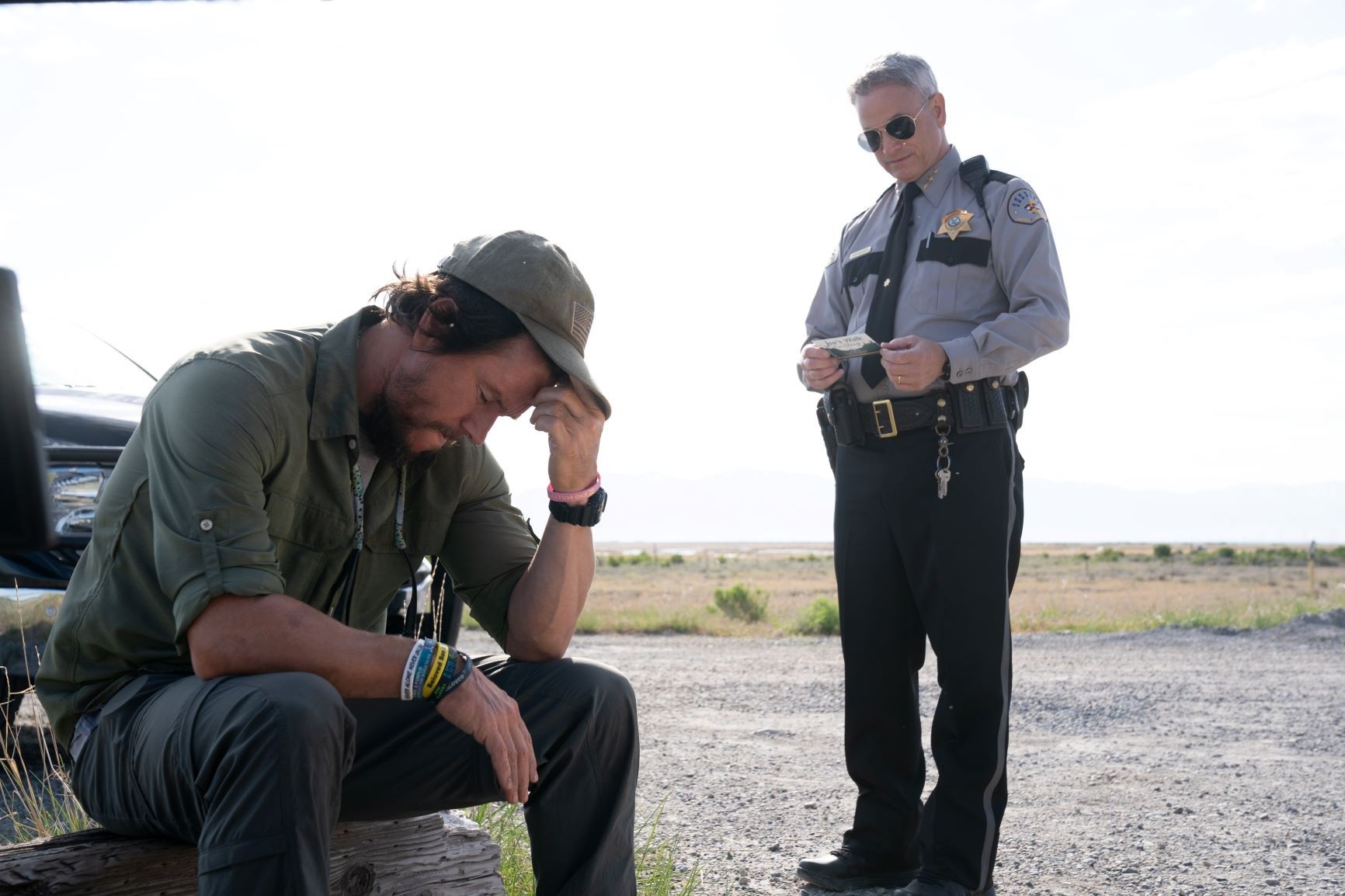
(2021) Biographical Drama (Roadside Attractions) Mark Wahlberg, Reid Miller, Connie Britton, Maxwell Jenkins, Gary Sinese, Morgan Lily, Blaine Maye, Igby Rigney, Coral Chambers, Scout Smith, David H. Stevens, Blake Barlow, Charles Halford, Jayne Luke, Juan Antonio, Kenadee Clark, Ash Santos, Cassie Beck, Christina Thurmond, Raquel Horton, Jason Cozmo, Christina Torriente. Directed by Reinaldo Marcus Green
Humans tend to fear the different, and that is particularly true of white straight males, or at least, so it seems sometimes. In a conservative town like La Grange, Oregon, a town that prides itself on “American values,” bullying young gay teens seems to have been accepted as adhering to those values.
Joe Bell (Wahlberg) is embarking on a quest; he is walking from La Grange to New York City to put a spotlight on bullying. His son Jadin (Miller) was viciously bullied after coming out, with people leaving messages on his social media profile urging him to off himself. Nevertheless, Jadin became the only male on the cheerleading squad and seemed to be almost defiantly queer, but all was not well. His dad supported him only superficially, so long as his son didn’t embarrass him. Possessed of a hair-trigger temper, Joe often grew enraged over petty things, and at every opportunity he had to show support for his son, he turned away.
But when Jadin takes his own life, Joe is driven by grief (and perhaps guilt) to make his quest, talking up his message to whoever will listen, or at least that’s what he sets out to do. The brutal truth is that Joe isn’t much of a public speaker and when ordering food in a diner, he overhears some other men making ugly homophobic remarks. Instead of confronting them, he hands them a card and leaves, which Jadin rightfully chides him for. You see, even though Jadin is gone, his spirit is walking alongside Joe every step of the way, alternately cheering him on and questioning his methods and motives.
There are no heroes in this movie except for maybe Jadin, and often Jadin is made out to be a stereotype, a martyr of teen bullying. Joe is self-centered, truly a product of a conservative rural town in which men are in charge, women are there for support and those who don’t fit in are to be humiliated, shunned and driven away. Joe acts the way he does because he doesn’t know any better, and in that sense he is a tragic figure; tragic because he doesn’t see that his lack of support, his refusal to stand beside his son instead of sweeping him under the carpet as much as possible has left Jadin feeling alone and with nowhere to turn, which we see in a powerful scene that announces that Miller is a talent to be reckoned with.
As far as Wahlberg goes, this is not a movie that relies on his natural charisma and easy-going charm. Joe is rough around the edges and often says or does the wrong thing. He alienates his long-suffering wife Lola (Britton) and his other son Joseph (Jenkins) at a time when both are hurting, but Joe only sees his own grief. There’s a scene early on where he is addressing a noisy high school assembly about bullying and it’s almost painful to watch as Joe literally fumbles his way through, saying nothing of any depth and concludes with a lame “Any questions?” when he has given them nothing to analyze. It’s brilliant in the sense that you wouldn’t expect a blue collar dad from rural Oregon to suddenly turn into a brilliant orator. Grief isn’t always enough.
The writing, from the Oscar winning duo of Diana Ossana and the late Larry McMurtry who previously collaborated on the far superior Brokeback Mountain, is solid throughout, although to be honest it’s kind of hard to make something interesting of a movie that’s essentially about a guy walking down the side of the road. At times, the movie seems a bit maudlin, and it does feel like a movie that was meant for woke audiences rather than those who really need to see it I must say, however, that it was nice to see Gary Sinese on the big screen, although his role shows up late in the film as a sympathetic sheriff.
This is another movie whose heart is in the right place but could have used a bit of sprucing up to make it truly marvelous, but we’ll have to make do with memorable performances by Wahlberg and Miller which isn’t really a bad thing.
REASONS TO SEE: Heartfelt messaging. Wahlberg is solid in unfamiliar territory, and Miller is a breakout star.
REASONS TO AVOID: Preaches to the choir somewhat and maudlin in places.
FAMILY VALUES: There is some profanity including offensive slurs and disturbing thematic material.
TRIVIAL PURSUIT: Although Jadin is depicted to have died immediately in his suicide attempt, in reality he was still alive when he was discovered and hung on for 15 more days before being taken off life support and passing away.
CRITICAL MASS: As of 7/25/2021: Rotten Tomatoes: 37% positive reviews; Metacritic: 54/100.
COMPARISON SHOPPING: The Laramie Project
FINAL RATING: 7/10
NEXT: Till Death









